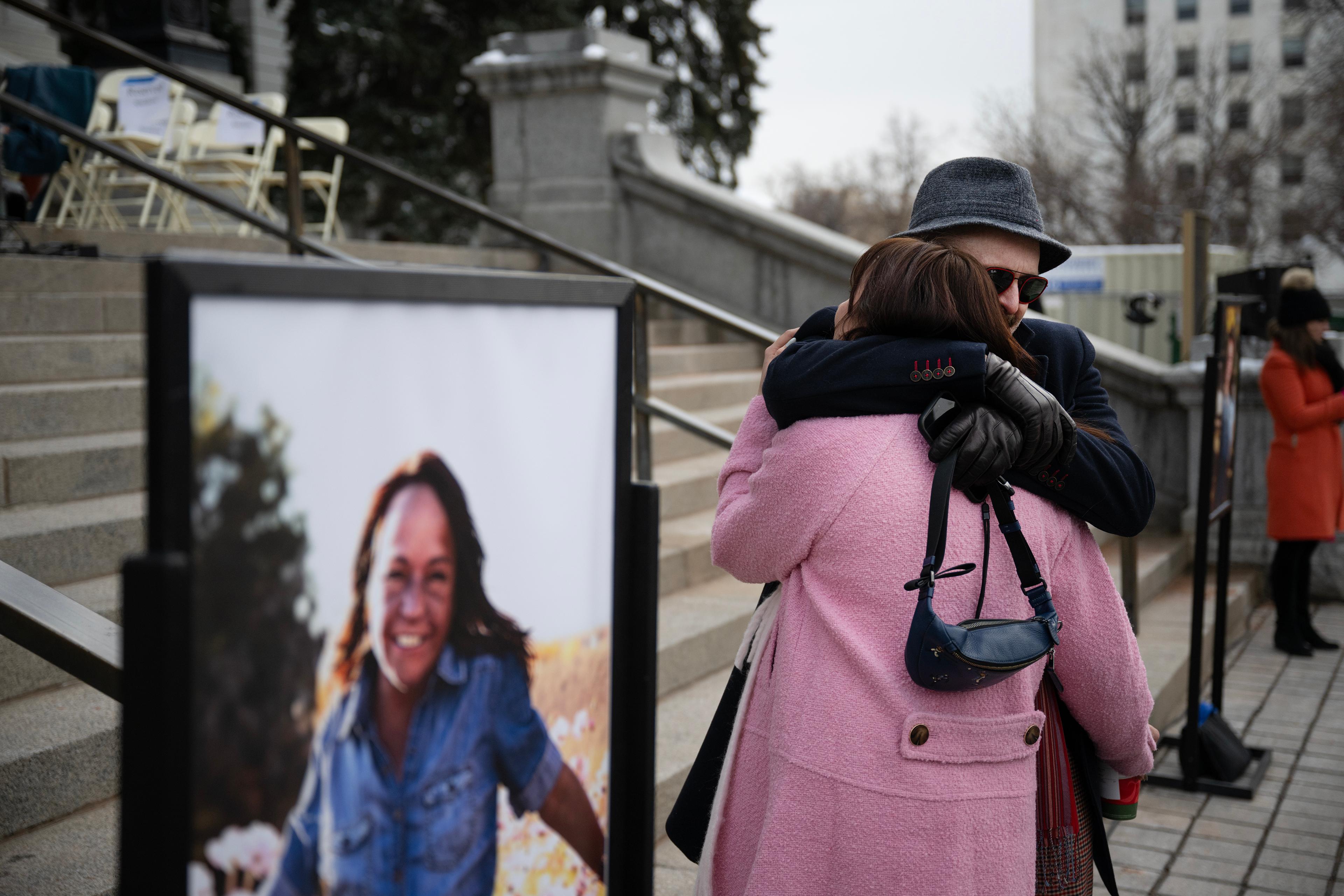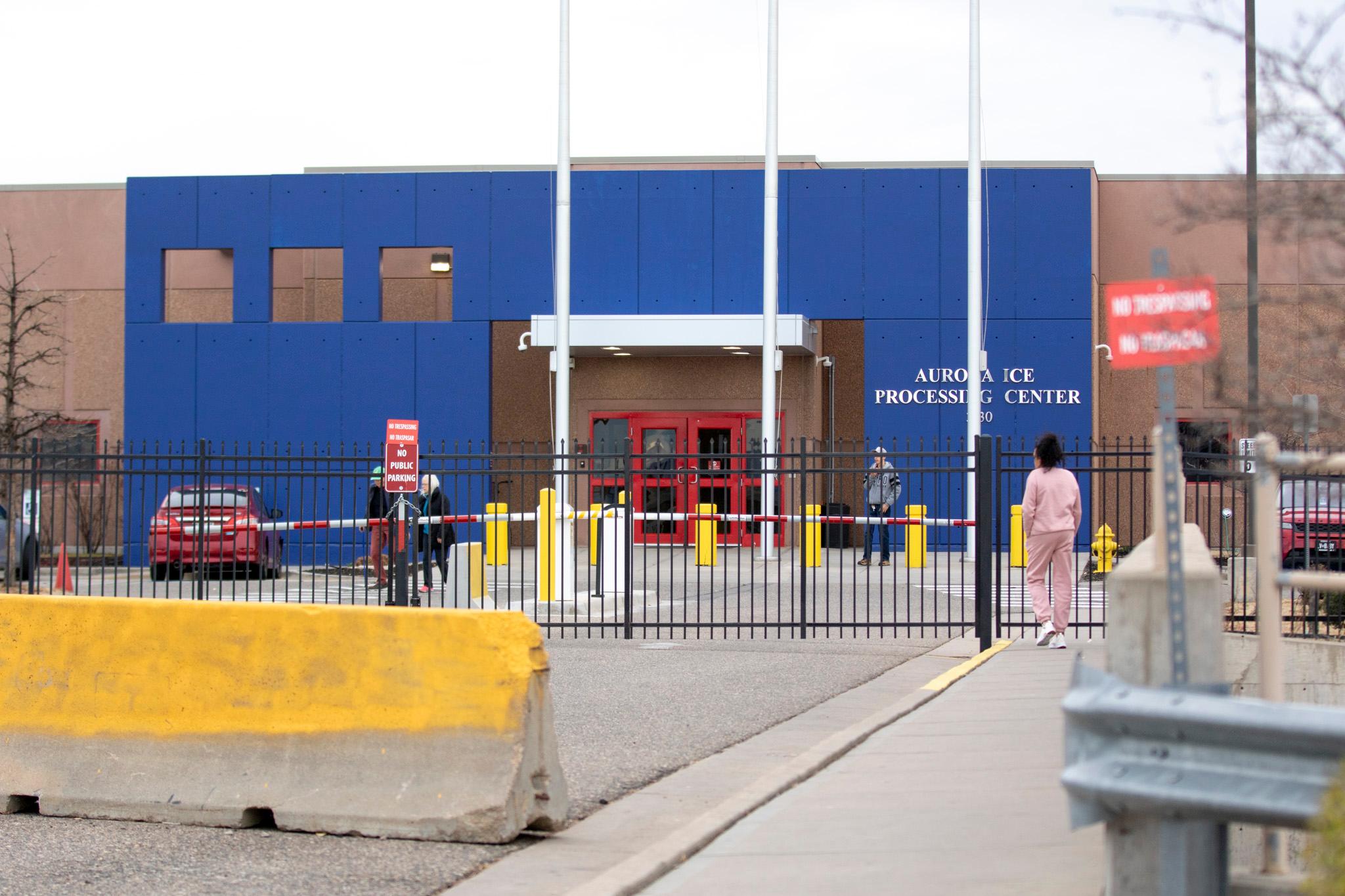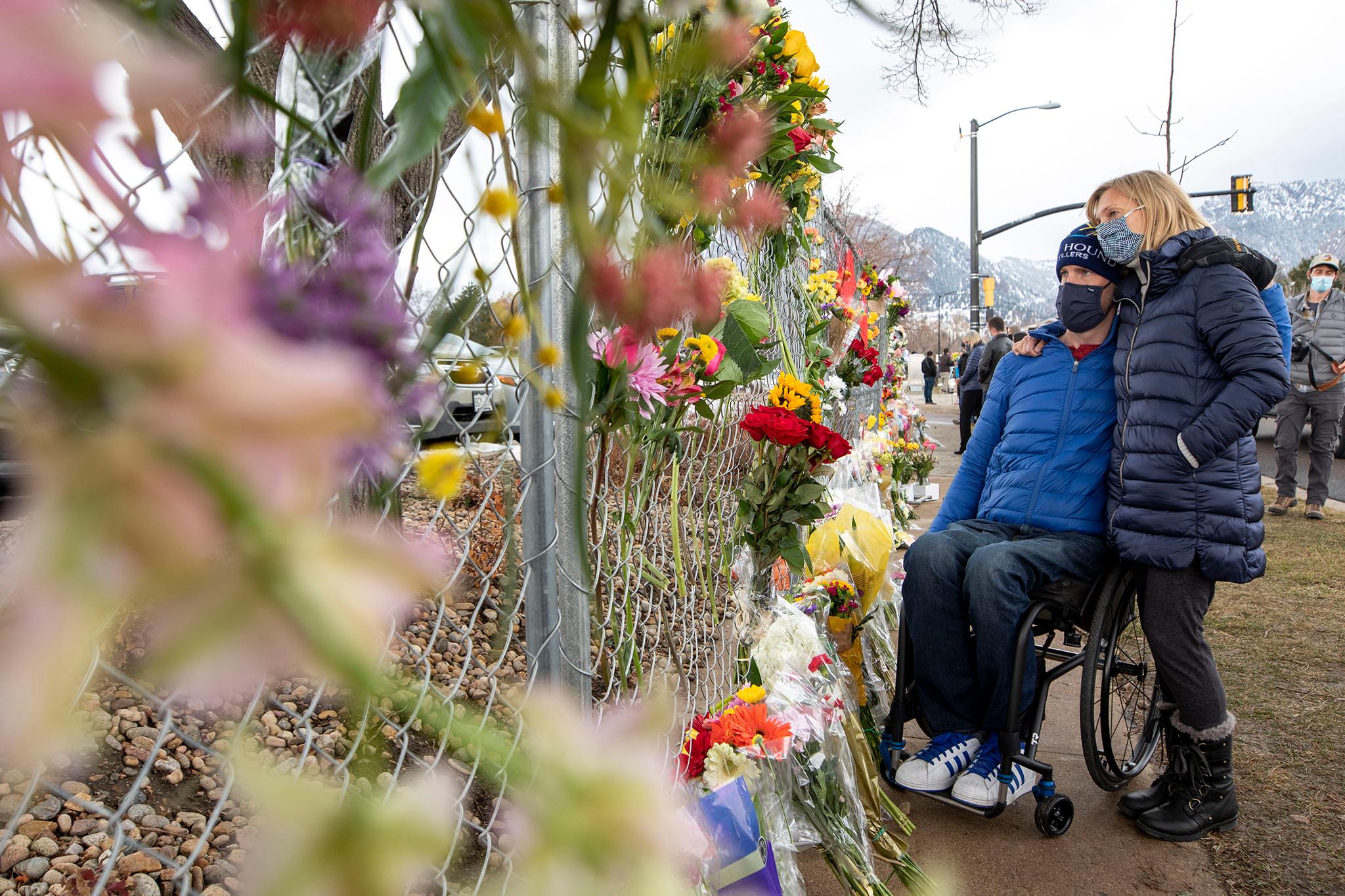
The mass shooting in Boulder has left Colorado lawmakers grappling with the same feelings of grief, resignation and concern as the rest of the country, wondering what comes next, and what policies or societal changes, if any, could stop this type of gun violence from occurring so frequently.
Democratic state Rep. Judy Amabile represents the district where the shooting occurred and has close ties to that particular King Soopers. She told CPR News her son used to work there, and his girlfriend is a current employee but wasn’t working when the shooting happened.
“I haven’t talked to her. I’ve talked to him and he was pretty stunned by that happening, but also not stunned, also not that surprised,” Amabile said. “And that's kind of how I felt too. Like, ‘Oh my God, it's something that we knew was inevitable.’ We just didn't know what it would look like or where it would happen. It's happening all over our country.”
The Boulder shooting occurred less than a week after eight people, mostly Asian women, were killed in Atlanta. It’s the largest mass killing in the state since the Aurora theater shooting in 2012.
State lawmakers put their legislative work on pause Tuesday morning to reflect on the Boulder tragedy, and take a moment of silence. But Amabile said she doesn’t want silence, because “the victims won't hear our silence.”
Many details about the accused 21-year-old shooter from Arvada are still unknown, but some who know him have described him as having “anger management issues.” Amabile said regardless of the man’s motives or mental state, Colorado needs to do more to improve mental health care, including stepping up funding. One of her children has bipolar disorder and schizophrenia and she said getting the right help has been nearly impossible.
“I have a huge amount of compassion for the people who died ... but I would also say I have compassion for the family of the perpetrator, and I hope people won't use this as a reason to shame and blame his family,” she said.
Dealing with the sudden loss of life due to gun violence is all too familiar for Colorado, which has had some of the highest numbers of mass shootings in the country, dating back to the attack on Columbine High School in 1999. These incidents have left deep scars on the Coloradans — and the lawmakers — who’ve lived through them.
“People say sometimes they think that we've gone kind of numb to this. I don't think that's true at all. I just think we've gotten good at it. We have a lot of practice," said Democratic state Rep. Tom Sullivan, whose son Alex was killed in the Aurora theatre shooting in 2012.
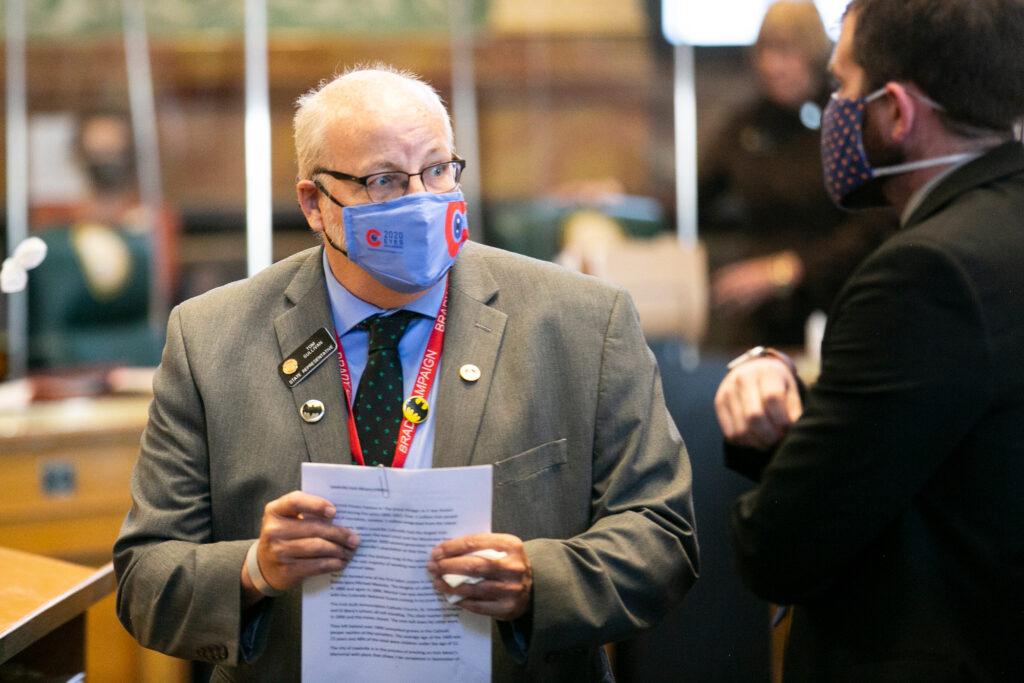
The Gun Bills At The Colorado Legislature This Session
Alex’s death motivated Sullivan to run for office to help pass stricter gun laws. He was the main sponsor of a so-called “red flag” gun law in 2019, which allows a family member or law enforcement to petition a court to temporarily remove someone’s guns for up to a year if they’re deemed dangerous to themself or others.
This session he's sponsoring a measure that would require people to report lost and stolen firearms. Some of his colleagues are also advancing a bill to require safe storage of firearms if there’s a risk they could be accessed by a child or someone who isn’t allowed to own guns. Both measures are making their way through the Democratic-controlled state House.
Sullivan acknowledges that gun policies alone can’t stop all mass shootings, but he views it as an ongoing issue, like the movement for civil rights, that needs to be addressed daily and tackled piece by piece. He sees part of his role as raising awareness. That’s one reason he wears his son’s leather jacket when he goes to work at the state Capitol.
“I hope that during the course of my day, that someone else will notice it and they'll see, this is what gun violence looks like. This is a survivor and a victim of a mass shooting.”
Opponents of the legislature’s efforts to strengthen gun laws say the policies lawmakers propose won't stop this type of violence and only hurt law-abiding gun owners. The issue has been a political lightning rod for voters. Two Democratic state senators were recalled in 2013 after they voted to pass a high-capacity magazine ban and universal background checks.
Republican state Sen. Jerry Sonnenberg said the only real way to address mass shootings, suicides and other gun crimes is by turning to a higher power.
“I will continue to pray for you,” Sonnenberg told his colleagues on the floor of the state Senate. “I'll continue to pray for those families. And I want us to remember that there is an answer. If we just look for it. I'm sorry to preach, but I think it's a message that needs to be said, that God needs to be back in our lives.”
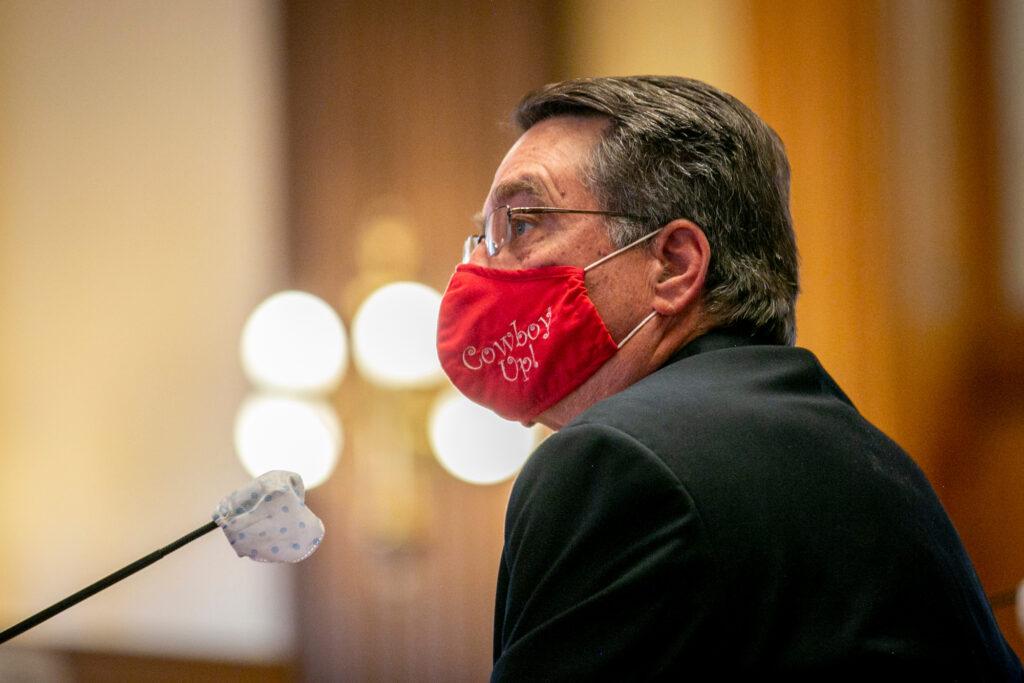
"The Federal Government Hasn't Stepped Up"
Republican state Rep. Richard Holtorf said he thinks the state and country have a mental health crisis. He didn’t advocate for specific policies the legislature should act on, but rather for people to start taking better care of each other.
“We need more love in this world. We need more outreach in our communities. We need more respect and understanding for our fellow man and our youth. We, as humanity, are so misguided. We have lost our respect for ourselves. We've lost respect for the human spirit. We've lost hope in very troubled times.”
Some lawmakers said they are still in a state of shock and it was too soon to figure out the next steps. Others were frustrated that just days before the shooting a state district court struck down the city of Boulder’s ban on assault rifles. The court cited a 2003 Colorado law that says cities and counties cannot restrict ownership of guns that are otherwise legal under state or federal law.
Democratic Speaker of the House Alec Garnett said he wishes the federal government would pass concrete gun laws, especially measures that have broad support, like extreme risk protection orders and universal background checks.
“When I look at all the things that the state has done, what makes me most angry is the fact that the federal government hasn't taken the same lead,” Garnett said. “The federal government hasn't stepped up and recognized the epidemic the way that we have here in Colorado.”
And like a lot of Colorado lawmakers, Garnett, who grew up in Boulder and at one point lived across the street from the King Soopers where the shooting took place, has been coping with his personal feelings around the enormous loss of life.
He said he was walking down the Capitol steps when a friend texted him about an active shooter at the King Soopers.
“It just kind of stopped me in my tracks. I immediately reached out to my parents who live in Boulder … but from that point on, I was sort of paralyzed in fear.”
Garnett also remembers where he was when he learned about the attack on Columbine high school and the Aurora theater shooting. And now this moment, too, will stay with him permanently.
- Donations: How You Can Help The Families Of The Boulder Shooting Victims
- Victims: Who We Lost In The Boulder King Soopers Shooting
- King Soopers Employees: "We Weren't Already Hard Enough? This Had To Happen Too?”
- Motive: Police Are Still Searching For A Motive
- Weapon: The Firearm The Suspect Bought Looks Like A Rifle, But It's Regulated Like A Handgun
- Guns: We Want To Hear From You: What Do You Want To Know About Gun Laws In Colorado?
- Next Steps: Colorado Lawmakers Are Considering A Ban On 'Assault-Style' Weapons
- In Photos: Here's Some Of What We Saw As Last Week Unfolded
- Mass Shootings: Colorado Has More Mass Shootings Than Other Places
- Mental Health: As Mass Shootings And Pandemic Collide In Colorado, Mental Health Experts Urge Connection Now More Than Ever
- Suspect: Boulder DA expects to file additional charges against the 21-year-old shooter





